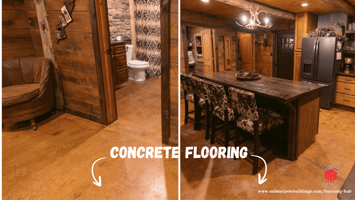What is a pole barn anyway? What exactly does it mean and what are they good for?
Smooth vs Ring Shank Nails: Choice for pole barns?
Learn about the differences between smooth and ring shank nails for pole barn construction, their advantages and disadvantages, and make an informed choice for your project’s needs.

Which choice of nail for pole barns should you use when framing?
When it comes to constructing a pole barn, every detail matters. One crucial decision that pole barn builders need to make is where to use smooth or ring shank nails. Choice of Nails for pole barns can be a crucial decision. Both options have their advantages and disadvantages, and understanding the differences between them is essential for ensuring a successful and durable pole barn structure. In this article, we will dive into the topic of smooth vs ring shank nails on pole barns, exploring their characteristics, benefits, and considerations. By the end, hopefully you’ll have a clear understanding of which type of nail is the right choice for your pole barn project.
Why is the Choice of Nails Relevant to Pole Barns?
Before we dive into the differences between smooth and ring shank nails, let’s understand why the choice of nails is relevant to pole barns. Pole barns are known for their simple and economical construction method that utilizes wooden posts or poles as the primary structural support. These posts or poles, along with the trusses and roof, bear the weight of the entire structure.
The nails used in pole barn construction in addition to the lags, screws and large structural nails play a critical role in securing the various components together. They provide structural integrity and prevent the risk of collapse or damage due to external forces such as wind, snow, or seismic activity. Therefore, selecting the right type of nails is crucial to ensure the stability and longevity of your pole barn.
Smooth Shank Nails: A Classic Option

Smooth shank nails have been widely used in construction for decades. These nails have a plain, untextured surface, which makes them easy to drive into wood without much resistance. Here are some key points to consider when using smooth shank nails on your pole barn:
-
Ease of Installation:
Smooth shank nails are effortless to drive into wood, making the installation process quicker and more efficient. These are good for interior walls that aren’t going to move or have large loads on them, and they work better at not splitting wood.
- Versatility:
Smooth shank nails can be used in various applications, not just in pole barn construction. They are suitable for specific interior framing, and general woodworking projects.
- Cost Effective:
Smooth shank nails are generally more affordable compared to ring shank nails, making them a cost-effective option for budget-conscious builders.
However, there are some considerations to keep in mind when using smooth shank nails:
- Smooth shank nails do not provide as much holding power as ring shank nails, especially in areas with high wind loads or seismic activity. If you’re constructing a pole barn, you must use ring shank nails for added security to your exterior shell.
- Due to their smooth surface, smooth shank nails have a higher tendency to be pulled out or loosened over time, especially if subjected to constant vibrations or movement.
- Smooth shank nails may be more prone to rusting compared to ring shank nails, especially if exposed to moisture or outdoor elements. This can lead to a decrease in their overall strength and durability.
Ring Shank Nails: Enhanced Holding Power

Ring shank nails, also known as annular nails, feature a series of rings along the length of the shank. These rings provide additional gripping power, improving the overall holding strength of the nail. Here’s why ring shank nails are a popular choice for pole barn construction:
- Superior Holding Power
The rings on ring shank nails create friction with the wood, making it harder for the nail to pull out. This enhanced holding power ensures that the components of your pole barn, such as the posts, beams, and trusses, stay securely in place even under extreme weather conditions.
- Increased Withdrawal Resistance
The threaded design of ring shank nails reduces the risk of withdrawal or loosening over time. They can withstand vibrations and movement, making them suitable for long-term stability.
- Increased Durability
The superior holding power of ring shank nails contributes to the overall durability of your pole barn. By using these nails, you can ensure that your structure remains strong and stable for years to come.
While ring shank nails offer many benefits, there are a few things to consider before using them:
- Due to their enhanced holding power, ring shank nails can be more challenging to install compared to smooth shank nails. You may need to use more force or a specialized nail gun to drive them into the wood effectively.
- Ring shank nails are generally more expensive compared to smooth shank nails. However, the additional cost is worth the impact to the overall budget of your pole barn construction project.
- Ring shank nails are primarily used for specific applications that require stronger holding power.
Remember, it’s always a good practice to consult with a professional pole barn builder or contractor to assess your specific needs and provide expert guidance on the right choice of nails for your pole barn project.
Choosing between smooth and ring shank nails for your pole barn is a decision that should not be taken lightly. While smooth shank nails offer ease of installation and versatility, ring shank nails provide superior holding power and durability. Understanding the advantages and considerations of each type will help you make an informed choice that aligns with your project’s requirements. By making the right nail selection, you can ensure a reliable and long-lasting pole barn structure that withstands the test of time.
If you have any additional inquiries that haven’t been addressed in this article, please don’t hesitate to reach out. For assistance with designing and planning your project, you can contact Milmar Buildings at 260-440-3190 or send us an email by clicking here.



